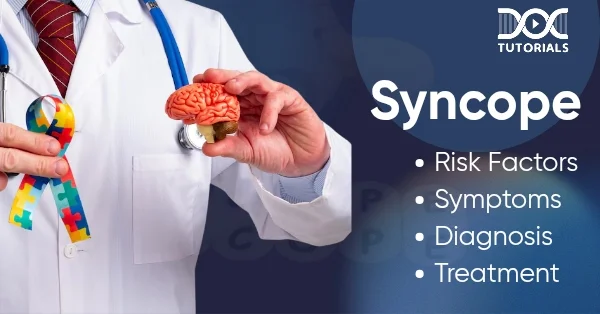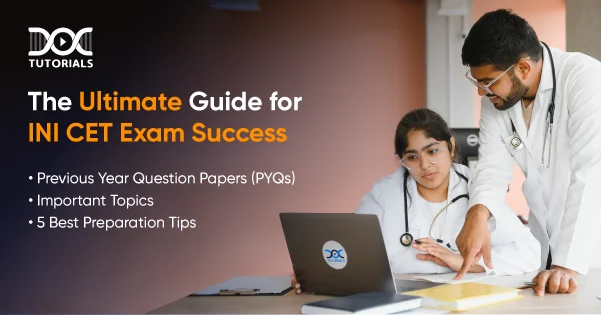Syncope: Risk Factors, Symptoms, Diagnosis, and Treatment

Syncope is a temporary loss of consciousness that usually subsides after a few minutes. While in most cases, syncope is harmless, it may sometimes be a sign of a medical condition, especially one related to the cardiovascular or nervous systems.
Understanding the causes, symptoms, and risk factors of syncope is essential for timely treatment and effective long-term management. Additionally, if you are an aspiring NEET PG medical student, learning about syncope is crucial for expanding your knowledge base and providing patient care.
Keep reading to find out more!
What is Syncope?
Syncope is a temporary blackout that results from an acute reduction in blood flow to the brain. This leads to a short-term interruption in brain activity and muscle control. Dehydration, hypoglycemia, and sudden change in posture are common precipitating causes of syncope.
Syncope is typically immediate, with prompt recovery without damage. Syncope can happen in any individual, but is most often seen in older individuals.
What are the Various Types of Syncope?
Syncope can be divided into several different types based on the syncope causes, such as:
- Vasovagal Syncope: This is the most common type and occurs when the body overreacts to specific stimuli—e.g., viewing blood, intense emotion, pain, hunger, stress, or dehydration.
- Postural Syncope (Orthostatic Hypotension): It occurs due to an abrupt change of position in a patient, e.g., getting up too fast from lying down, leading to low blood pressure and brief loss of consciousness.
- Cardiac Syncope: A more severe type caused by cardiac issues like arrhythmias, structural defects, heart failure, or a narrowing of the aortic valve. It may be associated with an increased risk of complications.
- Neurologic Syncope: Linked to disorders of the nervous system such as seizures, strokes, transient ischemic attacks (TIAs), or, in rare cases, migraines.
What are the Risk Factors of Syncope?
Syncope is not typically an illness but a symptom. It may happen because of common occurrences such as intense heat, dehydration, or standing for long periods. Nonetheless, certain people are more susceptible to certain intrinsic factors or underlying health conditions.
Here are the genetic non-modifiable risk factors that cannot be altered:
- Males
- Age of 80 years or more
- Family history or genetic susceptibility
Listed below are the medical conditions that are risk factors for syncope:
- Coronary disease
- Arrhythmias (irregular heart rhythm)
What are the Syncope Symptoms?
Syncope patients may exhibit the following symptoms:
- Sudden, temporary loss of consciousness
- Fainting, dizziness, or feeling light-headed
- Spontaneous falling or loss of balance
- Unusual fatigue or drowsiness prior to the attack
- Weakness in standing or with effort
- Tunnel vision or flickering visual disturbances
- Headache prior to or following syncope
What is the Diagnosis of Syncope?
If the patient is experiencing episodes of fainting, a healthcare provider must be consulted so that they can refer the patient to a syncope specialist for an evaluation. The syncope expert will begin by performing a physical exam and taking an in-depth history of the patient’s illnesses.
They’ll ask specific questions about the incidents, such as what symptoms they experienced before losing consciousness and the timing and setting of each episode. The patient’s lying-down, sitting, and standing heart rate and blood pressure might be monitored to see if there are any sudden changes.
Based on the result of these tests, additional tests can be prescribed, which are as follows:
- General health and the functioning of the heart
- Heartbeat and rhythm
- Blood volume capacity
- How does the patient maintain blood circulation whilst changing positions
The diagnostic tests reveal the cause of the syncope attacks and determine the best treatment course.
What is the Treatment for Syncope?
Managing syncope involves addressing its underlying cause. Some of the treatments that may be utilised are:
- Lifestyle Changes: Avoiding known triggers, such as prolonged standing, dehydration, or emotional distress. Fluid intake and diet also play crucial roles.
- Medication Therapy: If syncope is caused by a specific medical condition, such as blood pressure disorders or arrhythmias, the physician can treat it with medication to control or correct it.
- Pacemaker Implantation: In cases where a slow heart rate (bradycardia) or particular arrhythmias are responsible, a pacemaker may be inserted to help maintain a steady heartbeat.
- Surgical Repair: For those with structural defects causing syncope, heart surgery can be the treatment of choice.
- Implantable Cardioverter-Defibrillator (ICD): If the fainting is linked to serious arrhythmias that pose a risk to life, an ICD may be implanted to continuously monitor and automatically correct abnormal heart rhythms.
FAQs About Syncope
- Is syncope a serious condition?
Although syncope in itself is not dangerous, the underlying cause can be serious and requires medical attention. A doctor must be consulted to determine the real cause and assess any potential danger to health.
- Can dehydration lead to fainting?
Yes, dehydration is also a common trigger for syncope. When the body lacks sufficient fluids, blood volume decreases, reducing blood flow to the brain, which can cause fainting. Other related triggers include overheating, exhaustion, and rapid shifts in body position.
- Is weakness a symptom of syncope?
Feeling weak is one of the common warning signs that usually occurs before fainting. Nausea, sweating, dizziness, blurred vision, and a sudden drop in heart rate and blood pressure can also be experienced by a person before losing consciousness.
- Can drinking water help prevent fainting?
If it is already suspected that the patient will faint, recline and thrust the legs over the heart. In about one or two minutes, stand them up slowly and help them sip any liquid to restore circulation and avoid another attack.
- How can someone lower their chances of fainting?
The best way to prevent syncope is to identify and treat the underlying cause. Enough fluids resolve dehydration. Medication or medical devices will be required to regulate the heartbeat in heart syncope.
Conclusion
Syncope is a temporary loss of consciousness that may occur due to various causes—some benign, others more serious. Recognising the symptoms, identifying risk factors, and understanding when to seek medical attention are key to managing this condition effectively.
Understanding syncope is essential for every medical student preparing for the NEET PG exam. DocTutorials is here to be your perfect companion for studying NEET PG. With expert video classes, quick revision programs (QRPs), and interesting study notes, we prepare you for exams and make you eligible for actual medical situations.
Explore our NEET PG study material today!
Latest Blogs
-

INI CET Exam 2025: Your Roadmap to Success – Key Topics, Strategies, and Lessons from Last Year’s Papers
The INI CET exam is more than just a test; it’s a significant milestone for many medical students aiming to…
-

INI CET Exam Success: Previous Year Question Papers & Ultimate Guide – INI CET PYQ
One can feel overwhelmed while preparing for the INI CET (Institute of National Importance Combined Entrance Test). A vast syllabus,…
-

INI CET Exam Pattern 2024: A Complete Guide with Subject-Wise Weightage
The Institute of National Importance Combined Entrance Test (INI CET) is your key to entering some of the most prestigious…





